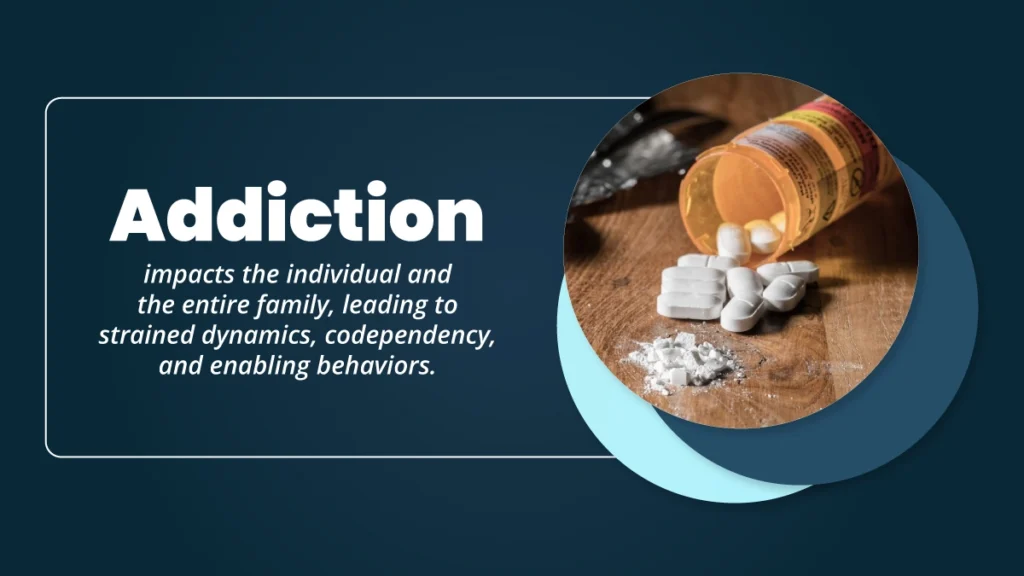Family therapy is a crucial and highly effective approach to addressing substance abuse issues that impact the individual and reverberate through the entire family unit.
This therapeutic modality offers a supportive and non-judgmental space where family members can explore their roles, address dysfunctional patterns, and develop healthier coping strategies.

Through a collaborative effort, family therapy seeks to strengthen relationships, enhance resilience, and promote long-term recovery from drug addiction.
Key Takeaways
Family therapy is crucial in treating drug addiction by addressing the underlying family dynamics contributing to substance abuse. Here’s what you need to know:
- Addiction impacts the individual and the entire family, leading to strained dynamics, codependency, and enabling behaviors.
- Family therapy is a form of therapy that involves the entire family system in the treatment of addiction.
- Family therapy helps family members understand the complexities of addiction, reduce blame and stigma, and develop empathy and support for their loved one’s recovery.
Contact The Haven Detox-Little Rock at (501) 271-3342 to get personalized addiction recovery treatments and achieve long-term sobriety.
How Addiction Impacts the Family
Addiction can have a profound impact on the family unit. The addictive behavior of a family member can lead to strained relationships, increased stress levels, and a breakdown of trust within the family. Family members often experience various negative emotions, such as anger, frustration, guilt, and sadness, as they witness their loved ones struggle with addiction.
The dynamics within the family can become disrupted, with roles and responsibilities shifting to accommodate the needs of the addicted individual. Financial instability and legal issues may arise due to the person’s addictive behaviors, further adding to the family’s burden.
Children growing up in an environment affected by addiction are particularly vulnerable, facing emotional, psychological, and developmental challenges. Moreover, family members may unintentionally enable addiction by enabling behaviors or sacrificing their well-being.
Seeking professional help and support groups can be vital in addressing the impact of addiction on the family, fostering understanding, healing, and recovery.
Role of Family in Addiction Recovery
The family plays a crucial role in the addiction cycle. They can either contribute to its perpetuation or play a vital role in breaking the cycle. Family dynamics and interactions can impact an individual’s susceptibility to addiction and their ability to recover.
Enabling behaviors, codependency, and unresolved family issues can fuel the addiction cycle, making it harder for the individual to seek help. Conversely, a supportive and healthy family environment can foster recovery by providing encouragement, understanding, and assistance in accessing treatment.
Family members can educate themselves about addiction, seek therapy or support groups, and establish boundaries to promote healing and break the cycle. Ultimately, the family’s involvement and commitment are crucial in helping their loved ones overcome addiction.
Types of Family Therapy for Addiction
Family therapy recognizes that addiction affects individuals struggling with substance abuse and significantly impacts their family members and relationships. Each family’s situation is unique, and the effectiveness of family therapy may vary.
It is advisable to consult with a qualified mental health professional or addiction specialist to determine the most appropriate treatment approach for your specific circumstances.
Here are some common types of family therapy for addiction:
Multidimensional Family Therapy (MDFT)
MDFT is an evidence-based approach that addresses substance abuse in adolescents and young adults. It involves the entire family and targets multiple domains, including the individual, family, peer group, and school or work settings.
The therapy aims to strengthen family relationships, improve communication, address underlying issues, and enhance the individual’s functioning within various contexts.
Behavioral Couples Therapy (BCT)
BCT is a form of therapy that involves both the individual struggling with addiction and their romantic partner. It focuses on improving relationships and promoting abstinence. BCT typically combines behavioral interventions, such as contingency management and communication skills training, to reduce substance use and enhance the couple’s functioning.
Family Systems Therapy
This approach views the family as an interconnected system where each member’s behavior affects and is affected by others. It focuses on identifying and changing dysfunctional patterns of interaction within the family.
The therapist helps the family members develop healthier communication, problem-solving, and coping skills to support recovery and improve family dynamics.
Brief Strategic Family Therapy (BSFT)
BSFT is primarily used with adolescents and their families. It seeks to identify and modify interaction and family dynamics patterns contributing to substance abuse. The therapy aims to increase family support, improve communication, and enhance problem-solving skills.
BSFT is often conducted relatively short, targeting specific addiction and family functioning issues.
Structural Family Therapy
This approach focuses on restructuring the family system to improve boundaries, roles, and interactions. The therapist works with the family to identify and modify dysfunctional patterns contributing to addiction and related problems.
Structural family therapy helps the family members develop healthier ways of relating to one another and addresses issues that may be enabling or perpetuating addictive behaviors.
Solution-Focused Brief Therapy (SFBT)
SFBT is a goal-oriented therapy that emphasizes finding solutions rather than dwelling on problems. It involves identifying strengths and resources within the family and building on them to create positive change.
SFBT is typically a brief intervention that encourages family members to set specific goals, explore strategies for achieving them, and develop a vision of a better future without addiction.
Advantages of Family Therapy in Addiction Treatment
Family therapy provides several advantages in addiction treatment and recovery.
Here are some of the benefits of family therapy in addiction treatment:
- Enhanced understanding: Family therapy helps family members better understand addiction as a disease. It educates them about addiction’s causes, consequences, and dynamics, reducing blame, guilt, and misunderstandings. This increased knowledge can improve empathy and support for the individual in treatment.
- Family involvement and support: Addiction affects the entire family system, not just those struggling with substance abuse. Family therapy allows family members to participate in the treatment process actively. It promotes open communication, cooperation, and understanding, creating a supportive environment for the individual in recovery.
- Identification of enabling behaviors: Family therapy helps identify enabling behaviors that can inadvertently support addictive behavior. These behaviors may include covering up for the individual, providing financial support without accountability, or ignoring the consequences of addiction. Through therapy, families can learn healthier ways to support their loved ones while maintaining boundaries and promoting personal responsibility.
- Healing family dynamics: Addiction often strains family relationships and creates a breakdown in trust, communication, and emotional connection. Family therapy offers a safe space for family members to address underlying issues and work through conflicts. It facilitates healing and rebuilding of relationships, fostering a supportive and stable environment for sustained recovery.
- Relapse prevention: Family therapy equips family members with the tools and strategies to recognize signs of relapse and prevent its occurrence. It educates them on the triggers and warning signs of addiction, enabling them to provide the necessary support and encouragement during challenging times. Family involvement can significantly reduce the risk of relapse and improve long-term outcomes.
- Holistic approach: Addiction is a complex issue that involves biological, psychological, social, and environmental factors. Family therapy takes a holistic approach by addressing these multiple dimensions. It recognizes the importance of integrating family dynamics, relationships, and support systems in the recovery process into the treatment plan.
- Strengthening the recovery foundation: Family therapy not only focuses on the individual in treatment but also emphasizes the overall well-being of the family unit. By fostering understanding, communication, and healthy coping mechanisms, family therapy helps create a stable foundation for long-term recovery. It encourages ongoing family support and provides a network of accountability for the individual in recovery.
Challenges in Family Therapy
Family therapy, like any form of therapy, can present various challenges. Following are some common challenges that may arise in the context of family therapy:
- Resistance and defensiveness: Family members may be resistant to therapy or defensive about discussing sensitive issues. They might feel uncomfortable revealing personal information or fear judgment from the therapist or other family members.
- Power imbalances: Power dynamics within families can complicate the therapeutic process. Some family members dominate conversations, while others feel marginalized or silenced. The therapist must navigate these imbalances and ensure that all voices are heard and respected.
- Communication difficulties: Communication breakdowns are often at the core of family conflicts. Family therapy aims to improve communication patterns, but addressing deeply ingrained patterns of ineffective or hurtful communication can be challenging. Family members may interrupt, blame, or misinterpret each other, making it difficult to foster understanding and empathy.
- Complex family dynamics: Families are complex systems with intricate interconnections and histories. Unresolved conflicts, generational patterns, or traumatic experiences may impact family functioning. Understanding and untangling these dynamics can be challenging, especially when family members have differing perspectives or interpretations.
- Multigenerational issues: Family therapy may uncover unresolved issues that span multiple generations. Addressing historical grievances, cultural differences, or intergenerational trauma requires sensitivity and understanding of how these factors influence family dynamics.
- Individual and systemic needs: Balancing the needs of individuals within the family system and addressing broader systemic issues can be challenging. The therapist must find ways to support individuals’ growth while considering the impact on the family unit.
- Lack of motivation or engagement: Not all family members may be equally invested in the therapy process. Some may attend sessions reluctantly or harbor skepticism about the effectiveness of therapy. Engaging and motivating all family members to actively participate can be a significant challenge.
- Ethical considerations: Family therapists face ethical dilemmas, such as maintaining confidentiality when working with multiple family members, managing conflicts of interest, or making decisions prioritizing the well-being of the individual versus the family unit.
Tips for Families Dealing with Drug Addiction
Dealing with drug addiction within a family can be incredibly challenging, but some strategies and tips can help you navigate this difficult situation.
Here are some suggestions for families dealing with drug addiction:
- Educate Yourself: Learn as much as possible about drug addiction, including the signs, symptoms, and treatment options. Understanding the nature of addiction will help you approach the situation with empathy and knowledge.
- Seek Professional Help: Reach out to addiction specialists, therapists, or counselors who can guide and support individuals struggling with addiction and their family members. They can offer valuable insights and help you develop a plan of action.
- Establish Open Communication: Encourage open and honest communication within the family. Create a safe space where everyone feels comfortable expressing their thoughts, concerns, and emotions without judgment. Effective communication helps build trust and fosters understanding.
- Set Boundaries: Establish clear boundaries to protect yourself and other family members from the negative consequences of addiction. Boundaries can involve setting limits on behavior, refusing to enable addictive behaviors, and communicating expectations.
- Practice Self-Care: Caring for yourself is crucial when dealing with addiction in the family. Take time for self-care activities like exercise, meditation, hobbies, or with supportive friends. It’s important to prioritize your well-being.
- Avoid Enabling: Protecting or enabling a family member struggling with addiction can be tempting, but enabling prolongs the problem. Avoid providing financial assistance to support the addiction. Instead, focus on supporting their recovery efforts.
- Seek Support: Find support groups or organizations that specialize in helping families affected by addiction. Sharing experiences and learning from others who have been through similar situations can provide comfort, guidance, and a sense of community.
- Practice Empathy and Compassion: Remember that addiction is a complex disease, and the person struggling with it is not defined by their addiction. Approach the situation with empathy and compassion, understanding that recovery is a challenging process that requires support and understanding.
- Encourage Treatment: Encourage your family members to seek professional help and treatment for their addiction. Offer support in finding appropriate treatment options and accompany them to appointments if they are willing.
- Stay Hopeful: Recovery from addiction is possible, and a sense of hope is essential. Celebrate small victories and milestones along the way, and remain committed to supporting your family member’s journey toward recovery.
Frequently Asked Questions (FAQ)
What is family-focused therapy for addiction?
Family-focused therapy for drug and alcohol addiction is a therapeutic approach that involves the entire family in the treatment process. It recognizes that addiction affects the individual and the family unit.
The therapy aims to improve family dynamics, communication, and support to facilitate the recovery of the addicted individual. It focuses on identifying and addressing family patterns and behaviors that contribute to addiction and promotes healing and resilience within the family system.
What therapy is used for addictive behavior?
Cognitive Behavioral Therapy (CBT) is commonly used to treat addictive behavior. It focuses on identifying and changing unhealthy thought patterns and behaviors related to substance use disorders. Motivational interviewing, a client-centered approach, can also be beneficial.
Other therapies include contingency management, which rewards positive behaviors, and family therapy to address underlying issues. Treatment plans may vary depending on the specific addiction and individual needs.
Why is family therapy important in substance abuse?
Family therapy is crucial in substance abuse treatment as it addresses the impact of addiction on the entire family unit. It helps improve communication, rebuild trust, and establish healthy boundaries. Family members gain insight into the causes and dynamics of addiction, enabling them to provide support and avoid enabling behaviors.
Therapy promotes long-term recovery by fostering a supportive and understanding environment involving the family.
Combat Drug Addiction Together at The Haven Detox-Little Rock
Break free from addiction and reclaim your life at The Haven Detox-Little Rock.
Experience personalized care, compassionate guidance, and a range of proven treatments tailored to your unique needs. We offer a comprehensive range of addiction treatment services, from detox to residential programs, designed to guide you toward long-term recovery.
Furthermore, our dedicated professionals employ a holistic approach, combining counseling, evidence-based therapies, and medications to address the root causes of addiction, no matter if it’s heroin, alcohol, or opioids.Take the first step towards a healthier and happier tomorrow. Call us today at (501) 271-3342 to embark on your transformative journey to lasting sobriety.



